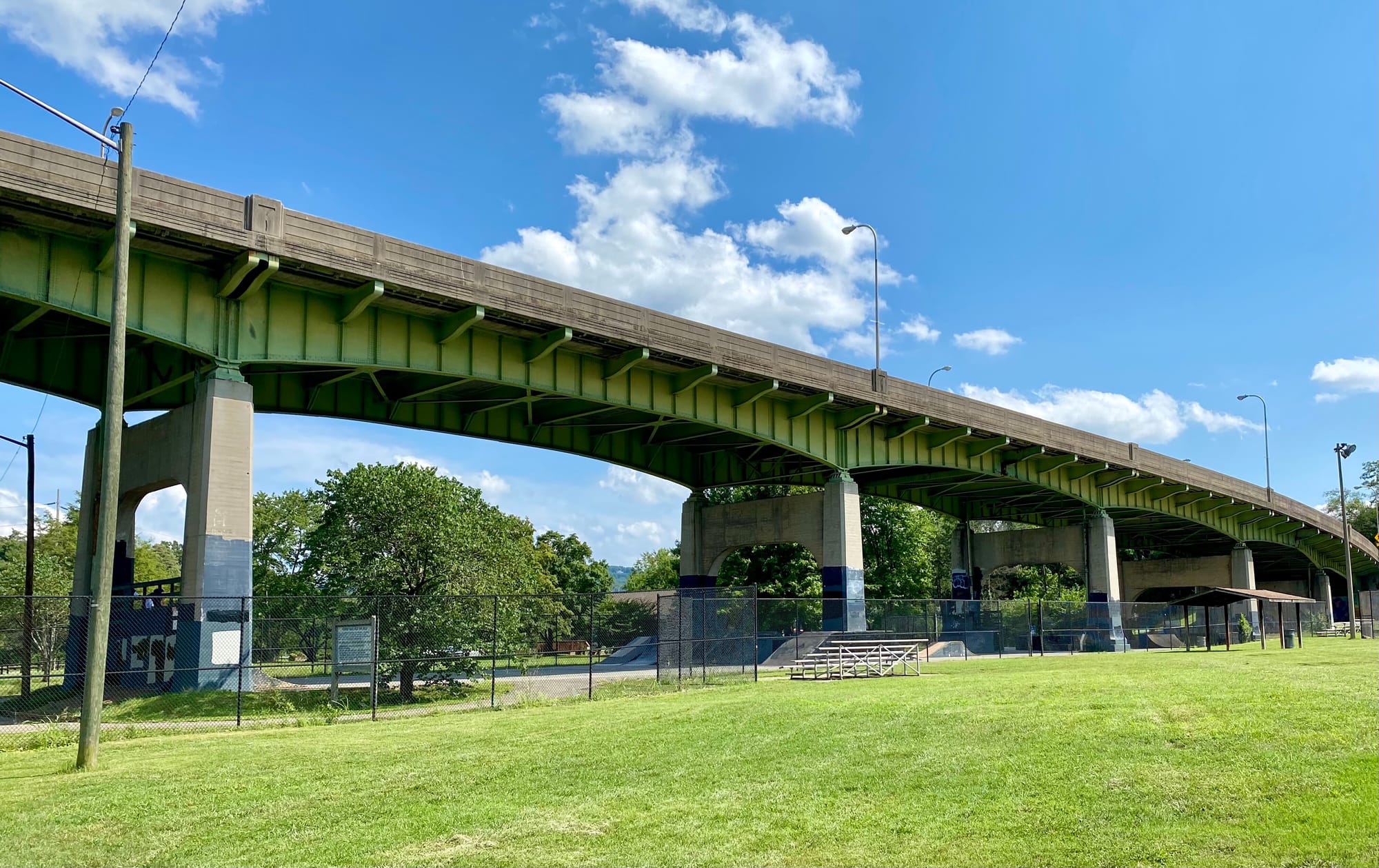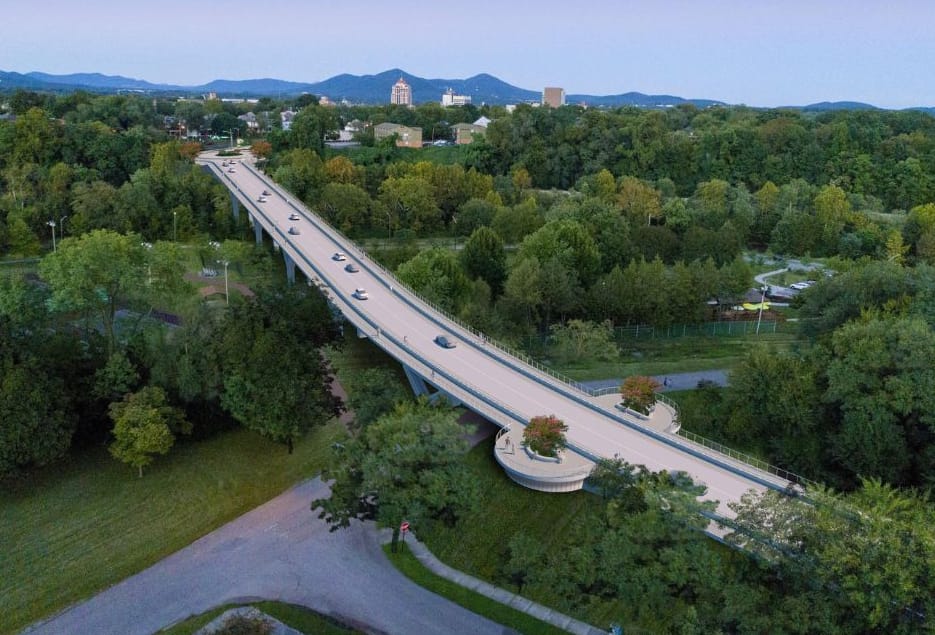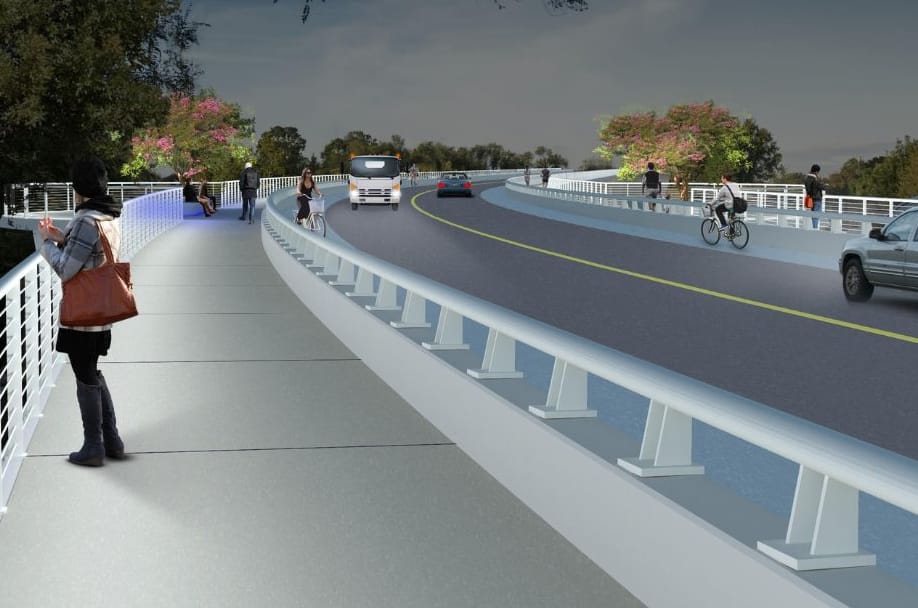Roanoke Readies New Wasena Bridge At Twice Initial Budget
Steel costs and the time it took to get permits from Norfolk Southern contributed to the bridge project's price tag, city manager says.

Roanoke’s replacement of the Wasena Bridge is moving forward at more than twice the initial estimated cost.
City officials expect to begin work in April on the $50.3 million project, which had previously been budgeted at about $25 million.
“It’s going to keep getting more expensive if we keep waiting longer, so let’s do it,” Councilman Luke Priddy said at a meeting last week.
The project is expected to be finished in the spring of 2026, the city announced Tuesday in a press release. Built from 1938 to 1939, the Wasena or Main Street Bridge is nearing the end of its useful life, city officials say, and needs to be replaced soon.
Planning for a new bridge started in earnest in 2018, with construction expected in 2022, but the pandemic curtailed progress. Since then, global and local forces have conspired to delay the project and increase costs, City Manager Bob Cowell told Council members.
Post-pandemic supply chain issues that saw the price of steel skyrocket. Also, since the bridge crosses five railroad tracks owned by Norfolk Southern, the city needed formal permission from the company.
“That permit took close to two years to secure, and certainly during that time we were watching prices, obviously, escalate as time went on,” Cowell said.
Norfolk Southern did not respond directly to questions about the time frame or whether the company would commit any funds for the project.
“Norfolk Southern works closely with municipalities on projects that require access to railroad property,” spokesperson Heather Garcia said in an email Tuesday. “Safety comes first, and construction work happening over railroad tracks comes with unique dangers that require extra attention and planning, which can take time. We’re continuing to work with city officials as they finalize plans.”
In 2019, when the city finished replacing the Franklin Road bridge — which spans 10 railroad tracks — it took 12 months to get permits from Norfolk Southern, according to city spokeswoman Tracy Lauder. Construction of the Franklin Road bridge, which is shorter than the Wasena bridge, cost $11.5 million, Lauder said.
The new Wasena bridge will include wider sidewalks, bike lanes, LED lighting and four “lookout” seating areas, as well as landscaping and new trees. A roundabout on the northern end will encroach on the former log cabin home of B & D Comic Shop, which moved to Brambleton Avenue.


Renderings of the new Wasena bridge by Mattern & Craig. IMAGES COURTESY OF CITY OF ROANOKE
Roanoke is planning a February groundbreaking ceremony and a “Wasena Bridge is Coming Down” party for March, a city press release said. The city says it will also launch a “Ways to Wasena” campaign aimed at boosting traffic to Wasena businesses.
The city is also planning to begin construction this fall on a new skatepark — on the site of Wasena Park’s tennis and basketball courts — to replace the skatepark beneath the bridge.
Earlier this month, the city awarded the bridge contract to Archer Western Construction, which submitted a $42 million bid, according to city records. The city says the rest of the project's cost is tied to engineering plans, land acquisition and railroad flagging services.
“The steel cost on this bridge alone is the cost of the entire Franklin Road bridge,” Cowell told Council members. “It is by far the largest capital project we’ve done in the city in recent history, at least going back to the high schools.”
To afford the bridge, Roanoke officials sought extra money from the Virginia Department of Transportation, which had committed $3.5 million. Last week, Council accepted an additional $6.5 million from the state agency.
Additionally, the city will push back, by six to nine months, planned construction for a new fire station on Williamson Road, freeing up bond funding.
When the city sought construction bids in November, the cost estimates were good for 60 days. The city asked Archer, the lowest bidder, for another 30 days to decide, Cowell said.
The company agreed to wait — but only if it could be held harmless if material costs rose during that time frame.
“That gives you the sense that any delay will likely result in increased costs,” Cowell said.
As recently as last month, before Roanoke secured extra VDOT funding, city staff were exploring whether to redesign the bridge or hold off on replacement altogether.
Cowell said in an interview that redoing the design process could take many more months, with no guarantee that the end result would actually cost less. And waiting could lead the bridge to fail — not that it would fall down, but that officials would have to restrict the weight of traffic that could travel across the bridge.
“That’s what we’re trying to avoid,” he said.

